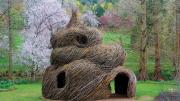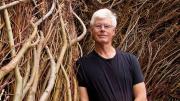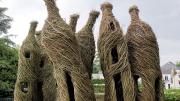What it will be, nobody exactly knows: neither the 50 volunteers who will have happily trudged for hours through muddy woodlands north of Boston to gather tractor-trailer loads of saplings—linden, beech, Norwegian maple, depending on what the thaw has yielded—nor the artist himself, Patrick Dougherty. Only during the three weeks spent laying out those saplings, planting some, and then bending, twisting, and weaving them all together do the final, fantastical forms emerge. The work opens to the public on May 23. Dougherty, who hails from North Carolina and earned degrees in English and hospital administration before pursuing art, has erected more than 250 such sapling-based structures across the country and around the world during the last three decades. Judging from these, what ends up on the lawn of the colonial-era Crowninshield-Bentley House in Salem, Massachusetts, on May 23, might feature turrets or Russian onion domes, or look like a condensed Moroccan palace. It could resemble a softer, sway-backed version of Stonehenge, a clump of medieval thatched huts, or skinny teepees pushed askew by the wind. Dougherty’s constructions tend to have doors and windows, but they are not homes. “Seussical” is too whimsical a description; the dreamscapes are more suited to a van Gogh landscape, or even The Scream. What might add another twist in Salem is whether, and how, Dougherty juxtaposes his installation with the symmetrical, squared-off Georgian-style home and its formal front entrance. Built by fish merchant and sea captain John Crowninshield in 1727, the house is a historic site now owned by the Peabody Essex Museum, which commissioned Dougherty’s work. Whatever the resulting forms, they are expected to stay up for two years—unless nature reclaims them first.
Patrick Dougherty's stick sculptures grace colonial Salem, Massachusetts
Patrick Dougherty's stick sculptures grace colonial Salem, Massachusetts
Sculptor Patrick Dougherty builds his latest fanciful structures on Boston's North Shore.



You might also like
Conan O’Brien Named Harvard’s 2026 Commencement Speaker
The comedian, host, and 1985 graduate will deliver remarks at the May 28 ceremony.
Harvard’s Hasty Pudding Honors Rose Byrne
The Bridesmaids actress celebrated her 2026 Woman of the Year Award with a roast and a parade.
Harvard’s Hasty Pudding Toasts, Roasts Michael Keaton
The Batman actor was “encouraged as hell” by the students around him during the 2026 Man of the Year festivities.
Most popular
Explore More From Current Issue

At Harvard’s Beck-Warren House, Ghosts Speak Many Languages
The quirky 1833 home now hosts Celtic scholars.

Inside Harvard’s Most Egalitarian School
The Extension School is open to everyone. Expect to work—hard.






